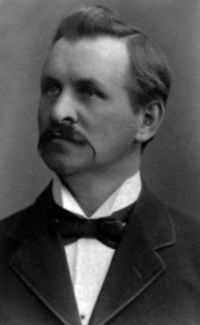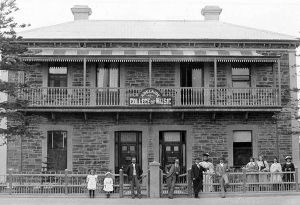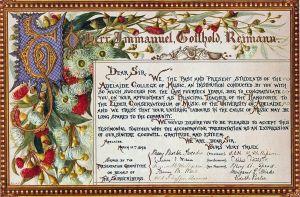Immanuel Gotthold Reimann (1859-1932)
Immanuel Gotthold Reimann, born near Hahndorf in South Australia, was the founder of the Adelaide College of Music, the deputy Director of the Elder Conservatorium at the University of Adelaide, and the first President of the Music Teachers' Association of South Australia.
Immanuel Gotthold Reimann | |
|---|---|
Immanuel Gotthold Reimann | |
| Born | Immanuel Gotthold Reimann 13 Jan 1859 Rebensburg, South Australia |
| Died | 19 Mar 1932 Norwood, South Australia |
| Resting place | West Terrace Cemetery, Adelaide, South Australia |
| Nationality | British |
| Occupation | Musician, Music Teacher |
| Spouse(s) |
|
Biography
Author: Rita Bogna
(originally published 2019 Burial and Cremation in South Australia. Used by permission of the author. All text and images are copyright unless otherwise indicated)
Immanuel Gotthold Reimann was born at Rebensburg near Hahndorf, South Australia, to Karl Friedrich Eduard Reimann (1816–1879) and his wife Blondina Klotilda Leontina (née Schröder) (1819–1905) on 13 January 1859. His father and mother were born in Prussia (in Schmölln (Thuringia) and Bomst (now Babimost in Poland) respectively) and married before migrating to South Australia. The couple arrived on the ship 'Emmy' from Hamburg on 15 January 1850. Fellow passengers on this trip included the winemaker Josef Ernst Seppelt who founded Seppeltsfield and Seppelt Wines in the Barossa Valley.
Karl and Leontina Reimann settled near Hahndorf where they established a farm called Rebensburg.
Immanuel Reinmann attended the Hahndorf Academy where he received instruction in singing and piano from Traugott Wilhelm Böhm (1836–1917). At the age of 14 he went to Adelaide to become a school teacher, but being afflicted with a throat ailment he returned to Hahndorf and studied piano with Otto Stange. In 1875 Reimann was appointed music master at the Hahndorf Academy. A few years he later moved to Adelaide and began to work as a music teacher.
Education in Germany
On 30 May 1879 Karl Reimann died at the age of 63. It was his dying wish that Immanuel should complete his musical education in Europe, so in the following year Reimann went to Germany. He studied at the Berlin Academy of Music (Neue Akademie der Tonkunst) conducted by Professor Dr. Theodore Kullak (1818–1882) who was pianist to the German Emperor and King of Prussia Wilhelm II. Reimann also studied at the Berlin Conservatory of Music conducted by Professor Franz Xaver Scharwenka (1850–1924) who was pianist to the Austro-Hungarian Emperor Franz Josef I. Professor Kullak repeatedly offered Reimann a position as a music teacher at his Berlin Academy. After passing an examination in musical pedagogy under Hans Bischoll, Reimann studied musical theory with various professors, including Franz Xaver Scharwenka and Albert Becker.
Return to South Australia
Reimann returned to South Australia in 1883 and opened the Adelaide College of Music in October of that year at 154-156 Wakefield Street. The College of Music Hall was situated nearby at 183 Wakefield Street.
On 20 December 1884 Reimann married Johanna Maria Lührs (1862–1945) at the Bethlehem Lutheran Church in Flinders Street. She had studied singing under him and taught at his College. The couple had five children: Leontine Meta (1884–1885), Carelen Edward (1887–), Valesca Leonore Olive (1888–1964), Hilda Marie (1892–1977) and Arnold Lührs (1898–1961).
In 1889 Cecil James Sharp (1859–1924) became a co-director of the College. Sharp had migrated to South Australia from England in 1882 and had become the assistant organist at the St. Peter's Anglican Cathedral soon after his arrival. He later became the conductor of the Adelaide Philharmonic. After his return to England in 1892, Sharp became famous for his research into English folk songs and he founded the English Folk Dance Society in 1911. Other musicians employed by Reimann included the violin teacher Hermann Heinicke (1863–1949) who founded Heinicke's Grand Orchestra, the cellist Hermann Kugelberg (c.1867–1950), and Otto Fischer and Guli Hack who taught singing. By 1896 the College had 250 students. When the Elder Conservatorium of Music was established in 1898 with a bequest from Sir Thomas Elder, Reimann incorporated his flourishing College of Music into the Conservatorium, bringing with him his teaching staff. Reimann was appointed Deputy Director and Teacher of Piano. On his appointment his students presented him with a hand coloured testimonial created by the botanical artist and illustrator Rosa Catherine Fiveash (1854–1938). For the first two years the Conservatorium was located at the College's premises in Wakefield Street.
In 1913 the Adelaide Daily Herald wrote: "Immanuel Gotthold Reimann is a name to be honoured by Adelaide music lovers, its possessor has been intimately connected with the development of the art in this city, and many accomplished local pianists and teachers owe much of their success to him". It went on to state that his father "had originally been trained for a musical career, but owing to parental objections he had to forego his intentions. Upon his arrival in South Australia he adopted farming as an occupation, but his artistic temperament resulted in a love for music being awakened in his son at an early age. The old man had been a member of the town pipers in the little German city of his birth, and as such had been taught to play the flute and clarinet. Later, however, he devoted his attention to the violin, and it afforded his son great pleasure to hear him play on the instrument after the toil of the day was over. He was also the fortunate possessor of a fine voice, and so when the night was cold, with the children would gather round the open hearth, and participate in the blessings of music in fashion". Reimann became honorary pianist and the director of the Adelaide String Quartet Club. He was a long-time member of the Australian Board of Musical Examinations and was its major editor of music. From 1891 until 1931 he was the organist and choirmaster at the Bethlehem Lutheran Church and used the Backmann organ which he imported from Germany in 1883. Reimann was regarded as an authority on the piano throughout Australia. Late in life he began preparing an edition of unpublished piano pieces by Mozart and just before his death he had arranged to revise the full list of Allan & Co's Imperial edition of publications.
In 1930 the Music Teachers' Association of South Australia (originally named the Musical Association of South Australia) was formed and Reimann was elected its first President. During the Association's first year four musical evenings were held and one of them was devoted to Reimann's compositions. In 1974 the Music Teachers' Association established a scholarship sponsored by the piano teacher Gwen Robinson, who was a student of Reimann. The name of the scholarship was later changed to Reimann-Robinson to honour her much loved music teacher.
One of Reimann's most famous students was Adelaide-born Maude Mary Puddy (1883–1974), who studied with him for several years. She was the first student to obtain the Diploma of Associate in Music in 1900 and after she was awarded a Bachelor of Music in 1905 she went to Europe to further her studies. There she became a pupil of Ferruccio Busoni and Theodor Leschetizky. She spent 14 years in Europe and become a renowned concert pianist. Puddy returned to Adelaide in 1920 and taught piano at the Elder Conservatorium until her retirement in 1949.
Reimann died at his residence at 12 William Street, Norwood, on 19 March 1932 at the age of 73 and was buried in the West Terrace Cemetery (Road 5 Path 25 Site 40W). His students and associates erected the memorial at his grave site. Johanna Maria Reimann died on 11 November 1945 at the age of 84 and was buried with her husband and their first daughter
Family
Reimann married Johanna Maria Lührs (1862–1945) at Bethlehem Lutheran Church, Adelaide, on 20 December 1884. They had the following children:
- Leontine Meta (20 June 1884 – 5 April 1885)
- Carsten Edward (15 May 1887 – 23 May 1974)
- Valesca Leonore Olive (20 December 1888 – 6 June 1964)
- Leona Marie (20 June 1890 – 24 March 1891)
- Hilda Marie (9 January 1892 – 20 October 1977)
- Arnold Lührs (3 July 1898 – 1 December 1991)
The Reimann's eldest daughter Leontine Meta died in 1885 at the age of 9 months.
Eldest son Carsten, known as Karey, was born with an intellectual disability and lived in supported accommodation until his death in 1974.[1]
Their second daughter, Valesca Leonore Olive, taught at Trinity College in Kandy, Sri Lanka, for 30 years. She never married.[1]
Hilda Marie also remained single and became a violinist, playing in the South Australian (now Adelaide) Symphony Orchestra.[1]
Arnold Lührs Reimann studied science and was awarded the degree of Doctor of Science from the University of Adelaide and Doctor of Philosophy from the University of Berlin. He became a lecturer in physics in the University College of Hull (University of London), and later a lecturer in physics in the University of Queensland and a researcher with the CSIRO. He was known as a physicist of high distinction and a fine cellist.[2][3][1]
Residences in the City
| Dates | Place | Current Address | Co-ordinates |
|---|---|---|---|
Work in the City
| Dates | Place | Current Address | Co-ordinates |
|---|---|---|---|
Published Obituary
From The Advertiser Monday 21 March 1932:
A Notable Musical Figure Passes
Mr. I. G. Reimann's Death
Taught Thousands
Mr. I. G. Reimann, teacher of piano and deputy-director of the Elder Conservatorium, died on Saturday afternoon at his home at William street Norwood. He had been ill with bronchial pneumonia for a week.
No one did more for the cause of music in South Australia than this urbane and popular enthusiast, whose Adelaide School of Music was the nucleus of the present Elder Conservatorium, and whose valued help and kindly encouragement have been shared by thousands of students now scattered in all parts of the world
For 57 years he exercised a wonderful influence over the musical life of South Australia, and after the formation of the Australian Board of Musical Examinations, this was extended to the whole Commonwealth; for not only was Mr. Reimann a delegate to the board, and one of its principal examiners, but he was also the editor and annotator of most of its publications. At the time of his death he had almost finished a complete revision of its examination works, had begun the preparation of an edition of hitherto unpublished pieces by Mozart, and had arranged to revise the full list of Allan's Imperial edition of musical publications.
As an examiner he travelled over a considerable part of Australia, and was everywhere regarded as an authority on the piano. His knowledge, practical and historical, of the literature of the instrument was immense, and his musical library, both at his home and at the Conservatorium, was acknowledged to be one of the finest in Australia.
Born At Hahndorf
A South Australian by birth — he was born at Handorf 73 years ago— be began his piano studies with Mr. T. W. Boehm in his home town, then had several years in Adelaide and in 1880 went to Berlin, first studying under Kullak and Bischoff, and later at the Berlin Conservatorium under Scharwenka. He returned to Adelaide thoroughly equipped for his life's work, and, founding the Adelaide School of Music, began to exert that influence on the art which soon caused South Australia to be widely recognised as one of the musical centres of the Commonwealth. He brought many well-known teachers of string instruments to Adelaide, and two of them, Messrs. H. Heinicke and H. Kugelberg, are still here.
Throughout his long professional career he kept himself thoroughly abreast of all the latest developments abroad, and paid several visits to Europe for further study.
On the establishment of the Conservatorium in 1898, Mr. Reimann accepted an invitation to merge his institution into the new organisation, and the whole of his staff and students came under the new regime. For the first two years of its existence, the Conservatorium was conducted at the headquarters of the School of Music. His death removes the last of the original conservatorium staff.
As a soloist Mr. Reimann was a remarkably fine pianist, though of recent years he did not play much in public. For the best part of his life he was organist at the Lutheran Church, and held that position until his death.
He has left a widow, two sons and two daughters — Dr. Arnold Reimann, of London, Mr. Karey Reimann, Miss Hilda Reimann, the noted violinist, and Miss Valesca Reimann, of Trinity College, Kandy, Ceylon.[1]
References
- ↑ 1.0 1.1 1.2 1.3 1.4 "Notable Musical Figure Passes". The Advertiser. Adelaide, South Australia. 21 March 1932. Retrieved 25 January 2021.
{{cite news}}: CS1 maint: url-status (link) - ↑ McCarthy, G J (20 Oct 1993). "Reimann, Arnold Luehrs (1898 - 1991)". Encyclopedia of Australia Science. Retrieved 25 January 2021.
{{cite web}}: CS1 maint: url-status (link) - ↑ Home, R W (June 1995). "REIMANN, Arnold Luehrs". Physics in Australia to 1945. Retrieved 25 January 2021.
{{cite web}}: CS1 maint: url-status (link)
External links
- Reimann, Immanuel Gotthold (1859–1932), Australian Dictionary of Biography
- Gotthold Reimann, Wikipedia


